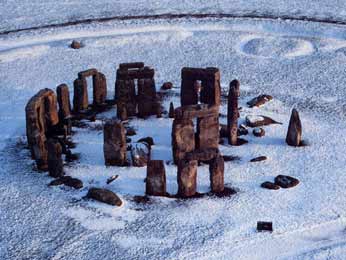Imagine the ice free Arctic of 5,000 years ago. Polar Bears drowning, Walruses unable to reproduce – but worst of all the planet must have been uninhabitable for humans.
2011 starts with lowest Arctic sea ice extent on record
Projections that start with more recent data will take some of this feedback into account. Projections that start with 1992 and 1995 data, as in the pink and purple lines on above image, predict a total loss of September Arctic sea ice by 2040 or 2030. A study that used 2007/2008 data as starting point predicts a nearly sea ice free Arctic in September by the year 2037.
Albedo change is only one of a number of feedback processes. A rapid rise of Arctic temperatures could lead to wildfires and the release of huge amounts of carbon dioxide and methane that are now stored in peat, permafrost and clathrates, which constitutes further feedback that could cause a runaway greenhouse effect. Heat produced by decomposition of organic matter is yet another feedback that leads to even deeper melting.
Humans and other mammals cannot survive prolonged exposure to temperatures exceeding 95°F (35°C), says Steven Sherwood. Heat stress would make many parts of the globe uninhabitable with global-mean warming of about 7°C (12.6°F). Warming of about 21°F (11-12°C) would make places where most people now live uninhabitable.



“A rapid rise of Arctic temperatures could lead to wildfires”
Really? A raging inferno sweeping across the tundra… burning what?
Like all these stupid stories that try to link wildfires to AGW, these fools forget about fuels. Most of the current problems related to more intense wildfires – e.g. California, Australia, anywhere in the western US – are a function of excessive fuel buildups thanks to Smokey the Bear and other fire suppression.
No fuel, no fire, no matter how hot and dry.
no rain, no fuel, no fire……..
Humans and other mammals cannot survive prolonged exposure to temperatures exceeding 95°F
================================================
ROTFL
What an idiot…..and there are idiots that would believe that too
I’m dead, I just didn’t knew it until now. That’s a regular temp in summer around here, and sometimes even more than that.
Humans and other mammals cannot survive prolonged exposure to temperatures exceeding 95°F
Well someone should tell the residents of Rio they are all dead.
Men can’t survive those temperatures without lots of beer and girls in bikinis. That was the survival mechanism at my ASU fraternity house – which had no A/C
See! This is all leading straight back to bikinis and beer! It’s the answer to Global Warming.
These are very sensible measures. Maybe I’m not dead after all.
This is the difference between wet-bulb and dry-bulb temperature. High temperatures are fine so long as you can cool yourself by sweating / evaporation. Or, of course, with air conditioning, but there’s precious little of that in (say) sub-Saharan Africa.
If the wet-bulb temperature goes over 95, you can’t physiologically cool yourself any more, which means you’re stuffed unless you literally spend time submerged in water cooling off.
The good news is that it’s not a realistic prospect until you get to 6+ degrees C warming, and that’ll only happen if there are major amplifying feedbacks such as release of methane from clathrate deposits. The scary thing is that that’s not completely unthinkable.
We are a totally unworthy, pathetic species if we can’t adapt to a little temperature change once in awhile.
One programme slipped through BBC’s net last night. A History of Celtic Britain with the always interesting Neill Oliver described the problems faced in the late Bronze Age by Climate Change – poor harvests, declining population, even a decline in metal working skills. The BBC editors clearly missed the fact that this climate change was a move towards colder weather.
Oliver compounded his felony a little later when he talked about how much conditions improved a few centuries later when the climate got better, i.e warmer.
I bet there will be much gnashing of teeth at the BBC when they find out this slipped through the net.
http://www.dailymail.co.uk/sciencetech/article-1374060/Gay-caveman-5-000-year-old-male-skeleton-outed-way-buried.html?ito=feeds-newsxml
35 degrees, in summer here it’s over that every day, we had a day that was 47 degrees C, I’m still alive LOL
We went jogging on that 47 degree day, when it was 36 degrees in the morning, still alive and kicking! Ran 10km!
“Humans and other mammals cannot survive prolonged exposure to temperatures exceeding 95°F (35°C), says Steven Sherwood.”
BS! I do it every summer at work, and our summers last about 8 months in Florida.
Inside the machine shop from HELL!
http://farm5.static.flickr.com/4048/4706726429_883f766e38_z.jpg
There’s a teensy problem with this theory. HVAC. Okay, lots of teensy problems. But this is one of them.
Oh look, “runaway greenhouse” is back.
I wish you would counter these types of articles with the evidence to the contrary. It would be redundant info for regular readers, but there are other people coming from the likes of Twitter and FB for the first time, who are not necessarily skeptics. They’re just going to see “2011 starts with lowest Arctic sea ice extent on record” and close the page.
All this global warming hysteria is even more ridiculous when considering the human body evolved on the hot open savanna of Africa. We’re relatively hairless except for a thatch on top to protect us from the sun, have the ability to sweat, and we’re upright; we were made to handle the heat during the day while most animals had to hunker in whatever shade they could find. 95 degrees F is nothing, especially if it’s dry.
95 degree dry-bulb temperature is only 74 degrees wet-bulb temperature given a typical savannah humidity of ~40%. Wet season humidity is higher, but temperatures are also lower. 95 degrees of wet-bulb heat will kill you, since at that point you can no longer lose heat by sweating.